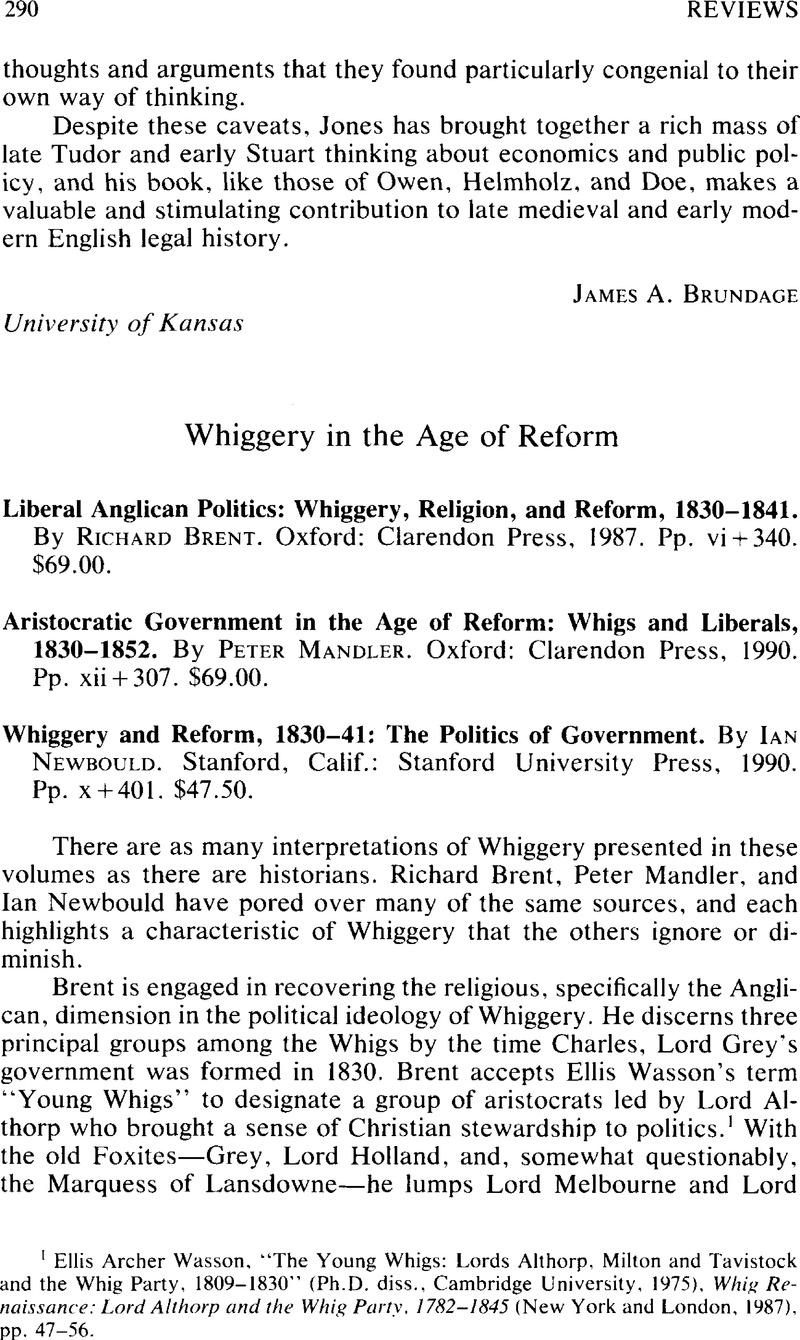No CrossRef data available.
Article contents
Whiggery in the Age of Reform - Liberal Anglican Politics: Whiggery, Religion, and Reform, 1830–1841. By Richard Brent. Oxford: Clarendon Press, 1987. Pp. vi + 340. $69.00. - Aristocratic Government in the Age of Reform: Whigs and Liberals, 1830–1852. By Peter Mandler. Oxford: Clarendon Press, 1990. Pp. xii + 307. $69.00. - Whiggery and Reform, 1830–41: The Politics of Government. By Ian Newbould. Stanford, Calif.: Stanford University Press, 1990. Pp. x + 401. $47.50.
Published online by Cambridge University Press: 10 January 2014
Abstract

- Type
- Reviews
- Information
- Copyright
- Copyright © North American Conference of British Studies 1993
References
1 Wasson, Ellis Archer. “The Young Whigs: Lords Althorp, Milton and Tavistock and the Whig Party, 1809–1830” (Ph.D. diss., Cambridge University, 1975)Google Scholar, Whig Renaissance: Lord Althorp and the Whig Party, 1782–1845 (New York and London, 1987), pp. 47–56Google Scholar.
2 Brent mistakenly identifies the immediate circumstance leading to that collapse as a church issue; but it was as a result of the imbroglio on the public meetings clauses of the Irish Coercion Bill that Grey's cabinet disintegrated in July 1834.
3 As Holland remarked, if one could combine expediency with principle on the Irish church issue, “Que m'importe?” Holland to Anglesey, October 24. [1832], Public Record Office. Northern Ireland. Belfast, Anglesey Papers, T1068/34, fols. 334–35.
4 Mandler's distinction between Foxite and moderate Whigs on Irish Church reform is misleading. Althorp and Lord Durham, neither worthy of Mandler's Foxite designation, were strongly in favor of appropriation, the latter even more vocal than Russell in his opposition to Stanley's principle of “nonalienation.” To refer to the more conciliatory on Irish Church reform as Foxite is inappropriate, even by Mandler's definition of their membership. Kriegel, A. D.. ’The Irish Policy of Lord Grey's Government,” English Historical Review 86 (January 1971): 22–45CrossRefGoogle Scholar. Moreover, when one considers that such supposed Foxites as Russell and Ebrington as well as Althorp and Thomas Babington Macaulay virtually admitted the unconstitutionality of the Irish Coercion Bill while defending it in Parliament, the emerging distinction between Foxite and other Whigs pales. Parliamentary Debates, 3d. ser., 15:1226, February 27, 1833Google Scholar, and 1333, 1362, February 28, 1833; 16:51–52, March 1, 1833, and 273, March 5, 1833.
5 Holland, who died in 1840. frequently invoked his uncle's memory, but in his last years, more often within the context of foreign affairs. When he identified himself as leader of “the old adherents of Mr. Fox” in 1840, he was referring to his opposition to sacrificing the constitutional alliance with France even if it meant the erosion of the Ottoman empire. Lord Holland's diary, [July 8, 1840]. The Holland House Diaries: The Diary of Henry Richard Vassall Fox, Third Lord Holland, with Extracts from the Diary of Dr John Allen, ed. Kriegel, Abraham D. (London. 1977), p. 418Google Scholar.
6 He once confided to Lady Holland that he had to endure a debate on a factory bill “which I could and would shrink” but for an important bill on foreign enlistments to be brought before the Lords thereafter. Lord to Lady Holland, n.d., British Library, Holland House Papers. Additional MS. 51730, fol. 149. Mandler, on three occasions, cites a letter of 1839 from Holland to Lord Granville where he urged the Whigs to devise “popular measures” and. thereby, restore the people's confidence in government. He was remarkably late with such entreaties. Six years earlier, Lord Althorp had warned Grey that, unless the Whigs took the lead in “Popular Measures, the Reform will lead to Revolution.” Althorp to Grey, January 1, 1833, Althorp Papers. (Now in the British Library, these papers were read when they remained in the possession of the Spencer family at Althorp Park, and the reference, therefore, lacks the British Library Additional Manuscript designation.)
7 Burrow, J. W., A Liberal Descent: Victorian Historians and the English Past (Cambridge, 1981), pp. 24–25CrossRefGoogle Scholar: Kriegel, Abraham D., “Whiggery and Liberty in Early Nineteenth-Century England,” Journal of Modern History 52, no. 2 (June 1980): 264–66CrossRefGoogle Scholar. The sense of exclusiveness was responsible, in part, for the aristocratic Whig disdain for Samuel Whitbread, the one figure among them who anticipated the kind of social reform legislation that Mandler now connects with Foxite Whiggery.
8 Roberts, David, Paternalism in Early Victorian England (New Brunswick, N.J., 1979), pp. 263–65Google Scholar.
9 Roberts, David, “The Utilitarian Conscience,” in The Conscience of the Victorian State, ed. Marsh, Peter (Syracuse, 1979). pp. 66–67Google Scholar.
10 Moore, David Cresap, The Politics of Deference: A Study of the Mid-nineteenth Century English Political System (Hassocks, Sussex, and New York, 1976)Google Scholar. See also by Moore, “The Other Face of Reform,” Victorian Studies 5, no. 2 (1961): 7–34Google Scholar, “Concession or Cure: The Sociological Premises of the First Reform Act,” Historical Journal 9, no. 1 (1966): 39–59CrossRefGoogle Scholar, and “Political Morality in Mid-nineteenth Century England: Concepts, Norms, Violations,” Victorian Studies 12, no. 1 (1969): 5–36Google Scholar.
11 Brundage, Anthony, The Making of the New Poor Law: The Politics of Inquiry, Enactment, and Implementation, 1832–1839 (London, 1978)Google Scholar.
12 Wasson, Ellis, “The Spirit of Reform, 1832 and 1867,” Albion 12, no. 2 (1980): 164–74CrossRefGoogle Scholar.
13 Russell, George W. E., “A Protest against Whiggery,” Nineteenth Century 13 (June 1883): 920–27Google Scholar.




